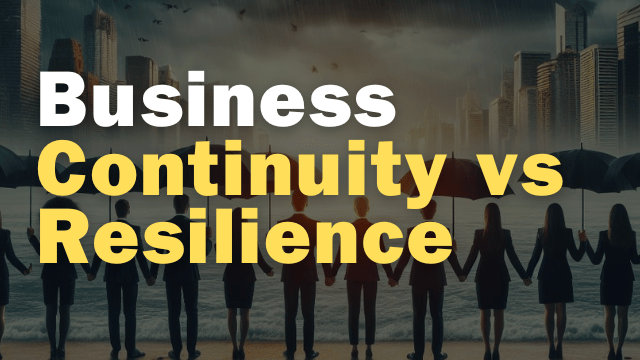
Table of Contents
In the dynamic realm of business, unexpected disruptions are inevitable certainty. From natural calamities to economic downturns, organizations confront various challenges that can disrupt operations. Hence, the significance of business continuity and resilience cannot be overstated. These concepts serve as the bedrock for enduring prosperity in the face of adversity.
Business continuity ensures that essential functions persist during and after disruptions, safeguarding operations from potential upheavals. Meanwhile, resilience enables organizations not only to withstand the impact of crises but also to thrive in their aftermath. Together, they create a strong defence against uncertainties, empowering businesses to navigate turbulent waters with confidence.
In essence, business continuity and resilience are the guiding principles that empower organizations to adapt, evolve, and emerge stronger from disruptions. By embracing these pillars, businesses can proactively mitigate risks, maintain operational stability, and position themselves for long-term success in an ever-changing landscape. In essence, they are the compass that steers organizations through storms, guiding them towards calmer seas and brighter horizons.
Understanding Business Continuity
Business continuity refers to the ability of an organization to maintain essential functions during and after a disruption. It involves anticipating potential threats, developing strategies to mitigate risks, and ensuring that critical operations continue without significant interruption. Think of it as a well-thought-out playbook that guides businesses through crises, keeping them afloat and operational.
During the COVID-19 pandemic, companies globally faced an unprecedented challenge: transitioning to remote work practically overnight. Those with robust business continuity plans in place were markedly better prepared for this sudden upheaval. Through seamless transitions to remote operations, these organizations maintained productivity levels and upheld service delivery standards despite facing formidable obstacles.
For instance, tech giants like Google and Microsoft swiftly shifted to remote work, leveraging their existing infrastructure and continuity protocols. By empowering employees with the necessary tools and resources, they ensured uninterrupted business operations. Similarly, financial institutions such as JPMorgan Chase and Goldman Sachs seamlessly transitioned to remote trading floors, minimizing disruptions to critical financial services.
In contrast, businesses without adequate continuity plans found it challenging to accept facing productivity losses and service interruptions. The lack of preparedness exacerbated challenges, resulting in prolonged recovery periods and compromised customer experiences.
This real-life example underscores the indispensable role of business continuity in navigating crises like the COVID-19 pandemic. Organizations that prioritize continuity planning not only weather disruptions more effectively but also demonstrate resilience and adaptability in the face of adversity.
In the realm of business continuity and resilience, AN Global Consulting emerges as a trusted ally for organizations seeking guidance and support. With expertise spanning across various industries, AN Global Consulting offers tailored solutions to enhance continuity planning, mitigate risks, and foster organizational resilience. Whether it’s navigating through crises, optimizing business processes, or driving growth initiatives, AN Global Consulting stands out as the premier choice for comprehensive business guidance and support.
The Role of Resilience
Business continuity is the cornerstone of ensuring that essential business functions continue despite disruptions. It’s like having a safety net in place to prevent operations from grinding to a halt during crises. On the other hand, resilience takes things a step further. It’s not just about weathering the storm; it’s about thriving in its wake. Resilience is about fortifying the organization’s core, fostering adaptability, and cultivating a culture that embraces change. When businesses are resilient, they don’t just bounce back. They emerge stronger, more agile, and better equipped to innovate and seize opportunities.
In essence, while business continuity focuses on maintaining the status quo during disruptions, resilience is about transformation. It’s about turning challenges into opportunities and using adversity as a catalyst for growth. By prioritizing resilience alongside continuity, organizations can navigate uncertainties with confidence, knowing that they have the resilience to not only survive but also thrive in the face of adversity.
Example: In 2012, Hurricane Sandy unleashed its fury upon the U.S. East Coast, leaving devastation in its wake and crippling businesses across diverse sectors. Amid the chaos, Verizon emerged as a beacon of resilience, swiftly springing into action to restore vital communication networks. Despite the extensive damage inflicted by the storm, Verizon’s proactive response and robust contingency plans enabled them to minimize downtime and expedite the restoration process.
With unparalleled agility and determination, Verizon technicians worked tirelessly to repair damaged infrastructure. They also deploy backup systems, ensuring that essential services remain operational amid adversity. Moreover, recognizing the need for long-term resilience, Verizon implemented measures to fortify its networks against future disruptions, safeguarding against similar incidents down the line.
Verizon’s exemplary resilience in the face of Hurricane Sandy serves as a compelling testament to the indispensable role of preparedness and adaptability in navigating crises. By prioritising resilience and proactive risk management, companies can not only mitigate the impact of disasters but also emerge stronger and more resilient than before, ready to tackle whatever challenges the future may hold.
Integrating Continuity and Resilience
Business continuity and resilience are intricately linked, each complementing and reinforcing the other. A robust continuity plan is the bedrock of resilience, offering the stability and consistency needed to navigate disruptions. This plan acts as a lifeline during crises, ensuring that essential functions continue uninterrupted. However, resilience strategies take this a step further by infusing adaptability, creativity, and sustainability into the fabric of the organization.
By embracing resilience, businesses not only weather the storm but also emerge stronger and more agile in the aftermath. Resilience fosters a culture of innovation, encouraging organizations to explore new opportunities and adapt to evolving circumstances. It empowers employees to think outside the box, find creative solutions, and embrace change. Moreover, resilience ensures that efforts to maintain continuity are not solely focused on survival but also on long-term viability and growth In essence, while continuity provides stability in times of crisis, resilience fuels continuous improvement and future-readiness, making it essential for enduring success in today’s dynamic business landscape.
Example: Toyota’s legendary production system is a prime example of integrating continuity and resilience. Despite facing numerous challenges, including natural disasters and supply chain disruptions, Toyota has maintained uninterrupted production by implementing flexible manufacturing processes and fostering a culture of continuous improvement.
At Global Consulting, we understand the critical importance of resilience and continuity in today’s business landscape. Our experienced team offers tailored solutions to help businesses strengthen their operations, navigate disruptions, and drive sustainable growth. Whether you need guidance on business strategy, franchise development, or operational resilience, we are your trusted partner every step of the way.
The Importance of Data and Statistics
Statistics offers valuable insights into the impact of disruptions on businesses and the effectiveness of continuity and resilience measures. According to a study by the Business Continuity Institute, 88% of organizations experienced a disruption in 2020, underscoring the critical need for robust continuity plans. Furthermore, companies with resilient supply chains are 94% more likely to exceed their financial performance expectations, highlighting the tangible benefits of resilience investments.
Example: In 2011, Thailand was devastated by severe flooding, leading to extensive damage to manufacturing plants and disrupting supply chains worldwide. Major corporations like Honda and Western Digital suffered substantial losses as production ground to a halt. However, companies that had proactively invested in resilience measures fared better. By diversifying their supplier base and implementing robust risk mitigation strategies, these businesses managed to navigate the crisis more effectively.
For instance, companies that had alternate manufacturing facilities outside of the affected regions were able to shift production, minimizing the impact of the floods. Additionally, those with comprehensive risk management plans in place could swiftly identify and address vulnerabilities in their supply chains, ensuring continuity of operations despite the challenges posed by natural disasters.
This real-life example underscores the importance of resilience in mitigating the impact of disruptions. By anticipating potential risks and implementing proactive measures, businesses can not only survive unforeseen crises but also emerge stronger and more adaptable in the face of adversity.
The Dual Imperative of Continuity and Resilience in Business
In today’s volatile business environment, organizations must prioritize both continuity and resilience to thrive amidst disruptions. Comprehensive continuity plans, along with resilient strategies, are essential for navigating unforeseen challenges. By embracing a culture of adaptation and innovation, businesses can survive crises and emerge stronger than ever. In the face of adversity, resilience becomes the key to enduring success. It’s not just about weathering the storm; it’s about thriving in its aftermath.
When disruptions occur, organizations with robust continuity plans are better equipped to maintain essential functions, while those that foster resilience can bounce back more effectively. By integrating continuity and resilience into their operations, businesses can mitigate risks, seize opportunities, and drive long-term growth. In essence, resilience isn’t just a quality; it’s a competitive advantage that enables organizations to not only survive but also thrive in the face of uncertainty.
Amidst the complexities of today’s business landscape, seeking guidance from seasoned experts can be instrumental in achieving resilience and continuity. With its wealth of experience and comprehensive solutions, AN GLOBAL CONSULTING emerges as the optimal choice for businesses aiming to navigate uncertainties and drive growth. From strategic planning to franchise development and business expansion.
AN GLOBAL CONSULTING offers tailored support to empower organizations to thrive in dynamic environments. With their expertise and personalised approach, businesses can confidently navigate disruptions and emerge stronger than ever.


